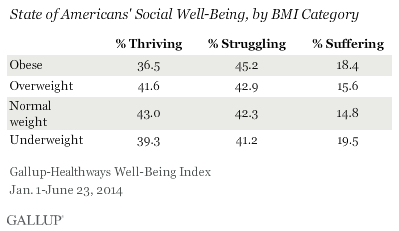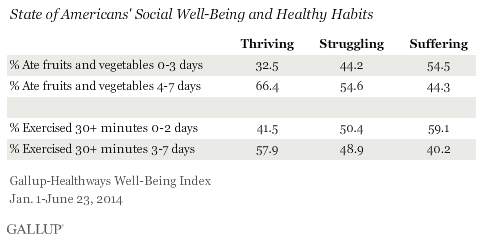WASHINGTON, D.C. -- Obese and underweight adults in the U.S. are somewhat less likely to be "thriving" socially and are more likely to be "suffering" than those who are normal weight or are overweight, but not obese.

In fact, those who are obese are the least likely across all weight groups to be thriving socially and underweight individuals are the most likely to be suffering, underscoring the risk of being at either extreme of the weight spectrum when it comes to social well-being.
These data, collected Jan. 1-June 23, 2014 as part of the Gallup-Healthways Well-Being Index, are based on more than 80,000 interviews, with U.S. adults, aged 18 and older. The social well-being scores are based on respondents' answers to items about the strength of their relationship with their spouse, partner, or closest friend; positive energy gained from family and friends; making time for trips or vacations with family and friends; and having someone who encourages them to be healthy. Gallup then categorizes respondents as "thriving" (well-being that is strong and consistent), "struggling" (well-being that is moderate or inconsistent), or "suffering" (well-being that is low and inconsistent) in their social well-being.
Overall, 41% of Americans are thriving, with 43% struggling and 16% suffering in their social well-being. Gallup previously found that more Americans are thriving in social well-being than in the other four elements measured as part of the Gallup-Healthways Well-Being Index.
Body Mass Index (BMI) scores are based on respondents' self-reported height and weight. A BMI of 30 or greater is considered obese, 25.0 to 29.9 is overweight, 18.5 to 24.9 is normal weight, and less than 18.5 is underweight. The majority of Americans are either overweight (35.3%) or obese (27.7%), and just over a third of Americans (34.9%) are a normal weight. The current obesity rate is significantly higher than the 25.5% found in 2008, when Gallup and Healthways began tracking it. A small percentage of the population today, 2.1% vs 1.8% in 2008, is underweight.
Although these data reveal a clear link between extreme weight and lower social well-being, the direction of the relationship is unclear. It is possible that those who are obese or underweight are less likely to have strong social relationships. These Americans may lack self-confidence or be negatively stereotyped based on their weight, making it harder to form or maintain relationships. It is also possible, however, that Americans who are struggling in their relationships with their friends or family are more likely to either eat too much or too little, making it difficult to maintain a healthy weight. Those who lack social support may also have a harder time correcting their eating habits if they veer off course.
High Social Well-Being Linked to Frequent Exercise and Produce Consumption
One possible explanation for the link between weight and lower social well-being is that Americans who have higher social well-being are more likely to eat produce regularly and exercise frequently. Americans who are thriving in their social well-being are more likely to eat at least five servings of fruits and vegetables four or more days per week than are those who are suffering in social well-being, 66.4% vs. 44.3%, respectively.
The results are similar for Americans who exercise regularly. While 57.9% of Americans who are thriving in social well-being exercise at least 30 minutes on three or more days per week, 40.2% of those who are suffering socially say the same.

Again, the direction of these relationships are not clear. Americans who eat well and exercise more frequently may have an easier time developing close social relationships. Or, those with high social well-being may receive emotional and practical support that makes exercising and eating produce easier.
Bottom Line
It is well known that obesity puts individuals at higher risk for chronic diseases such as high blood pressure, diabetes, and some cancers, but obesity also appears to be related to lower social well-being. It is not clear whether obesity leads to lower social well-being, or if low social well-being triggers lifestyle choices that lead to excessive weight gain. And the same issues and questions apply to underweight Americans.
Overweight Americans do not seem to suffer from lower social well-being, so whatever dynamic is at play -- either weight hampering social relations, or subpar social relations triggering weight gain -- is clearly specific to weight extremes.
Studies show that when someone gains weight, their close friends, regardless of whether they live close by, tend to gain weight also. Social networks and weight are clearly related, but how to harness this relationship and use it to help combat the rising obesity rate requires further research.
Survey Methods
Results are based on telephone interviews conducted as part of the Gallup-Healthways Well-Being Index survey Jan. 1-June 23, 2014, with a random sample of 84,890 adults, aged 18 and older, living in all 50 U.S. states and the District of Columbia.
For results based on the total sample of national adults, the margin of sampling error is ±1 percentage points at the 95% confidence level.
Interviews are conducted with respondents on landline telephones and cellular phones, with interviews conducted in Spanish for respondents who are primarily Spanish-speaking. Each sample of national adults includes a minimum quota of 50% cellphone respondents and 50% landline respondents, with additional minimum quotas by time zone within region. Landline and cellular telephone numbers are selected using random-digit-dial methods. Landline respondents are chosen at random within each household on the basis of which member had the most recent birthday.
Samples are weighted to correct for unequal selection probability, nonresponse, and double coverage of landline and cell users in the two sampling frames. They are also weighted to match the national demographics of gender, age, race, Hispanic ethnicity, education, region, population density, and phone status (cellphone only/landline only/both, and cellphone mostly). Demographic weighting targets are based on the most recent Current Population Survey figures for the aged 18 and older U.S. population. Phone status targets are based on the most recent National Health Interview Survey. Population density targets are based on the most recent U.S. census. All reported margins of sampling error include the computed design effects for weighting.
In addition to sampling error, question wording and practical difficulties in conducting surveys can introduce error or bias into the findings of public opinion polls.
For more details on Gallup's polling methodology, visit www.gallup.com.
